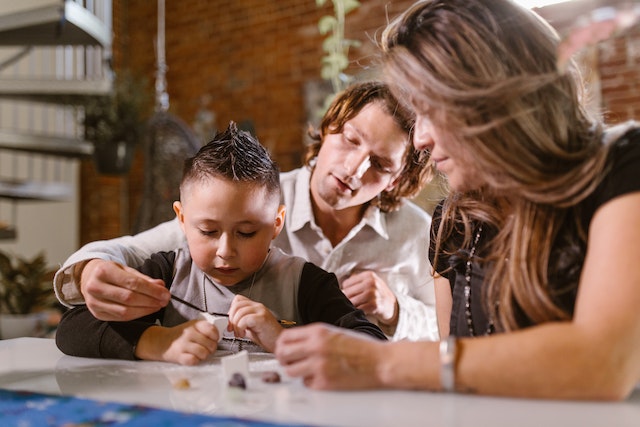Deprecated: Creation of dynamic property ILJ\Core\LinkBuilder::$multi_keyword_mode is deprecated in /home/c2041299c/public_html/wp-content/plugins/internal-links/core/linkbuilder.php on line 82
Deprecated: Creation of dynamic property ILJ\Core\LinkBuilder::$links_per_page is deprecated in /home/c2041299c/public_html/wp-content/plugins/internal-links/core/linkbuilder.php on line 83
Deprecated: Creation of dynamic property ILJ\Core\LinkBuilder::$links_per_target is deprecated in /home/c2041299c/public_html/wp-content/plugins/internal-links/core/linkbuilder.php on line 84
Is the Montessori Method the Best Way to Teach Kids?
The Montessori Method has long been a popular way to teach kids. Developed by Italian physician and educator Maria Montessori in the early 1900s, this method focuses on fostering independence, self-discipline, and respect for oneself and others through structured activities and hands-on learning. Today, the Montessori Method is used in many preschools, elementary schools, and other educational settings all over the world. But is the Montessori Method really the best way to teach kids?
What is the Montessori Method?
The Montessori Method is an educational approach developed by Maria Montessori in the early 1900s. It focuses on providing children with a holistic learning experience through the use of hands-on activities and self-directed exploration. In a Montessori program, students learn through a variety of activities and are given the freedom to explore their own interests. The classroom environment is designed to foster independence, self-direction, and creativity. Montessori schools typically involve multi-age classrooms and a focus on life skills. There is an emphasis on developing social skills and positive character traits in children. The Montessori Method has been adopted by thousands of schools around the world, both public and private.
How does the Montessori Method Work?
The Montessori Method is an educational approach that focuses on helping children develop their natural abilities, creativity, and independence. It is based on the theories of Maria Montessori, a pioneering Italian educator, who developed her approach in the early 1900s. The Montessori Method emphasizes independent learning, freedom of choice within limits, and hands-on activities.
At a Montessori program or school, the classroom environment is carefully designed to promote learning and exploration. Furniture, materials, and activities are specifically chosen to stimulate curiosity and foster learning. Instead of using lectures and tests, teachers focus on encouraging children to explore and discover. They provide individualized instruction and guidance, allowing each child to work at their own pace.
In the Montessori Method, teachers strive to foster a sense of self-discipline in the children. They use positive reinforcement and praise to guide children’s behavior and encourage them to stay focused on their activities. The teacher also assists in the development of social skills by providing opportunities for children to interact with one another in structured play activities.
Overall, the Montessori Method seeks to foster a love of learning in children by encouraging curiosity and exploration. By providing an environment that is conducive to learning and development, it enables children to reach their full potential.
What are the Pros and Cons of the Montessori Method?
Pros:
- Child-led and hands-on learning: The Montessori method emphasizes allowing children to explore their environment and make their own discoveries, fostering a love of learning.
- Emphasis on independence and self-directed discovery: The Montessori approach values allowing children to take control of their own learning process, developing their confidence and problem-solving skills.
- Multi-age classrooms foster community and collaboration: Montessori classrooms often include students of different ages and abilities, encouraging older students to help younger ones and promoting a sense of community and teamwork.
- Development of life skills, such as problem-solving and critical thinking: The Montessori method places a strong emphasis on developing practical life skills, including problem-solving, critical thinking, and effective communication.
- Respect for each child’s unique pace of learning: The Montessori approach recognizes that each child develops at their own pace and provides individualized support and guidance to meet their needs.
Cons:
- Lack of standardization across schools and classrooms: Montessori is not a standardized curriculum, and the quality of Montessori education can vary widely between schools and classrooms.
- Limited focus on traditional subjects, such as math and language arts: Montessori places more emphasis on hands-on, practical learning and may not provide as much direct instruction in traditional academic subjects as other educational approaches.
- Potential for lack of structure or discipline: While Montessori encourages independence, some may view its lack of structure as leading to a lack of discipline in the classroom.
- High cost of Montessori schools and materials: Montessori schools and materials can be more expensive compared to traditional public schools or other educational approaches.
- Limited availability in certain regions or communities: Montessori schools may be difficult to find in certain regions or communities, and may not be accessible to all families.
What Are Some Alternatives to the Montessori Method?
If you are looking for an alternative to the Montessori Method, there are several options available. Traditional schooling is the most common alternative to the Montessori program. Traditional schooling typically involves teachers lecturing students in a classroom setting and then giving them assessments to measure their understanding of the material. The traditional schooling model allows for more structure than the Montessori Method, but it can be less engaging for some students.
Other alternatives to a Montessori school include Waldorf and Reggio Emilia approaches. The Waldorf approach is based on storytelling, imagination, and creativity. It focuses on creating a stimulating learning environment that emphasizes natural development and play. The Reggio Emilia approach is an Italian-based education system that encourages exploration, collaboration, and problem-solving. It focuses on individualized learning that is tailored to each student’s interests and needs.
Finally, some parents choose to homeschool their children. Homeschooling allows parents to customize their child’s learning environment and curriculum to fit their specific goals and needs. It also allows children to have more control over their own learning and to work at their own pace.
No matter which alternative you choose, make sure that it’s right for your family. Consider your child’s individual needs and interests when making this decision. The most important thing is to provide your child with an education that is tailored to their unique needs and capabilities.
